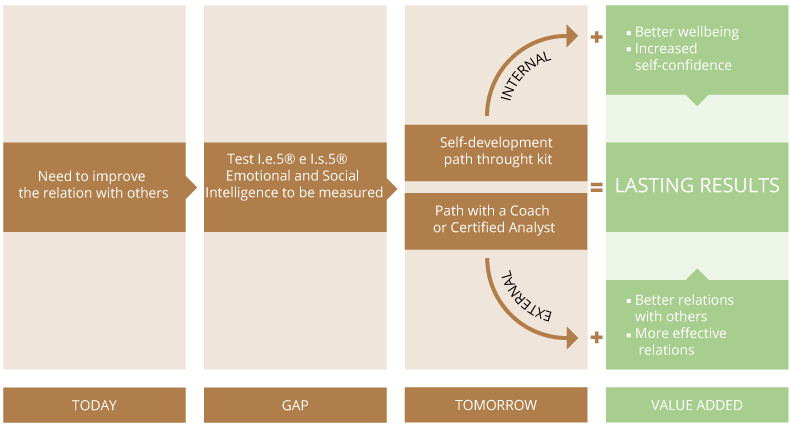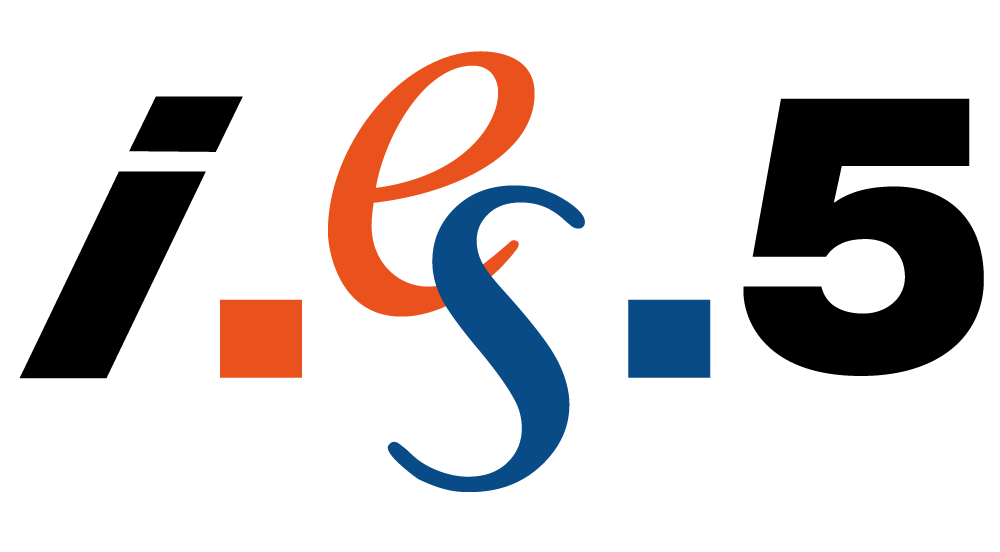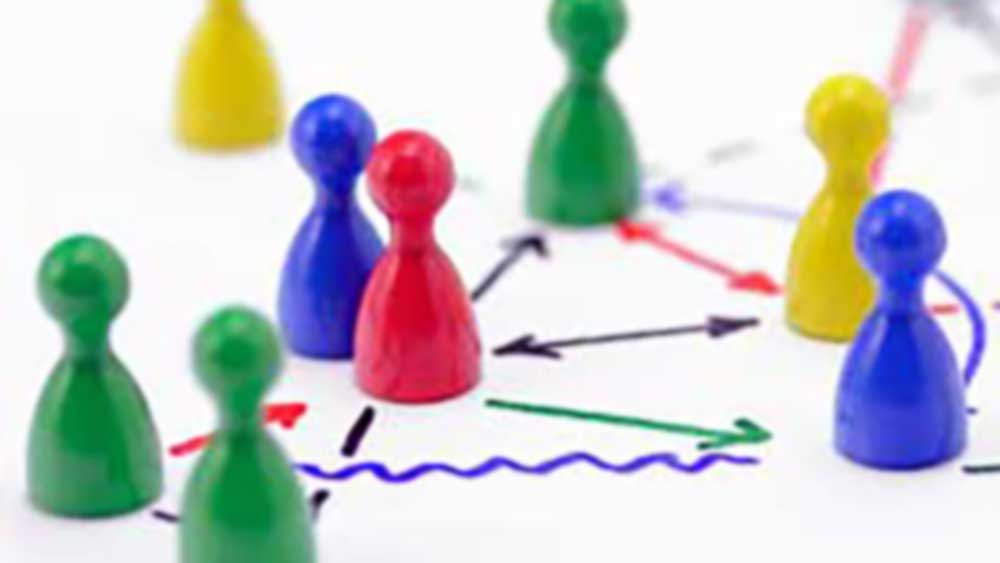Intelligence and resilience
HISTORY
Today we still refer, in many respects, to the historical and traditional concept of intelligence.
It has long been considered as opposite to intuition. Conceptual and logical sides of the thought have been seen as a privileged and unique form of intelligence. Other less logical and less rational behaviours would then be the results of instincts and therefore unchangeable. Renowned psychologists, united by a more “Aristotelian” vision on the possibility to improve and develop this area too, have researched emotions and published many studies on the subject. Among the forerunners Immanuel Kant may be cited, who firstly used the term “sensitive intuition”.
Henri Bergson defined intuition as “the deep and intimate knowledge of the authentic realities of beings and things”.
Only at the beginning of the XX Century the presence of other forms of human intelligence was conclusively defined.
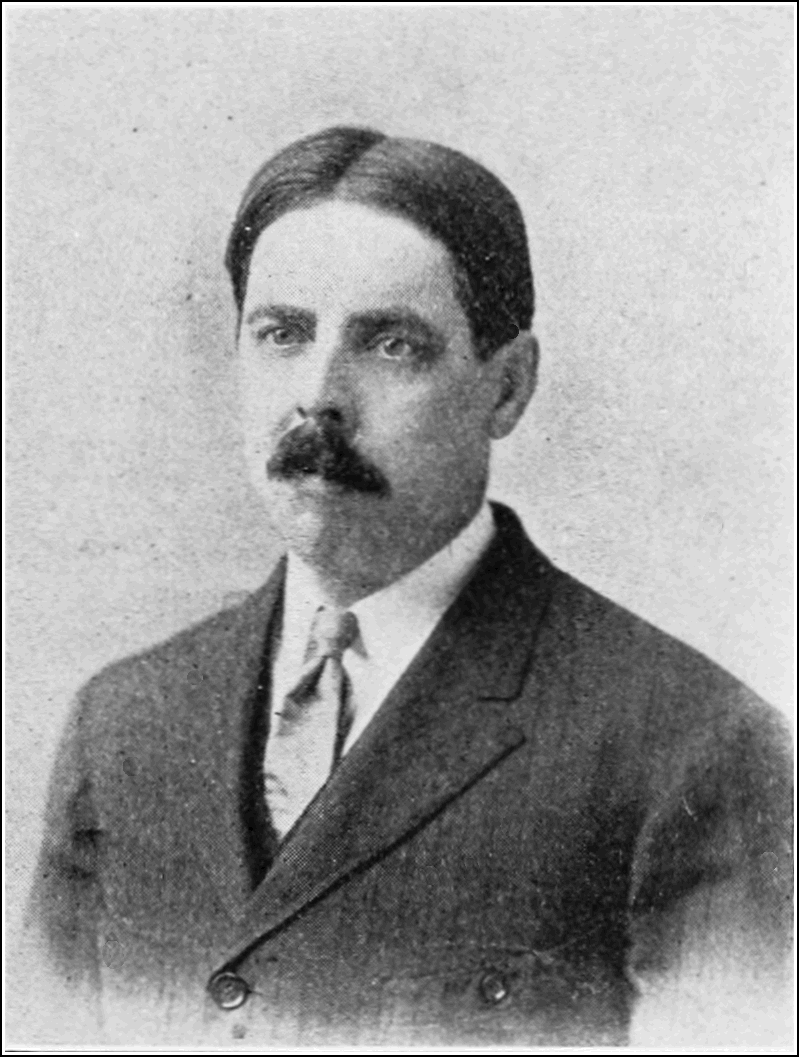
During the 1920s Edward Lee Thorndike started developing the theme of the intelligence’s “not uniqueness” and identified three main types:
- Abstract and conceptual intelligence, marked by the attitude to use verbal and symbolic forms.
- Practical and concrete intelligence, useful in handling and manufacturing goods.
- Social intelligence, the understanding of human beings and the easy interacting with them.
During the 1980s further progress and different approaches took place that emphasized the importance of contexts and environments.
Intelligence came to be described as “the person’s mental activity, aimed at selecting actual situations related to her/his own life, so to allow an intentional adjustment to the situations themselves, in order to organize and structure them” ( Th. De Sternberg).
Along the years different approaches on talkative and emotional intelligences set one versus another; one first important distinction of the several types of intelligence was defined by Howard Gardner, Professor of Psychology at Harvard University. He mentions 9 types:
9 TYPES OF INTELLIGENCE
- Musical intelligence
- Kinaesthetic or bodily intelligence
- Logical-mathematical intelligence (measured by the IQ test)
- Language intelligence
- Spatial intelligence (specific of sculptors and painters)
- Interpersonal intelligence (intuitive ability to understand others)
- Interpersonal intelligence (ability to self-analize oneself)
- Naturalistic intelligence (ability to recognise plants and animals that look alike)
- Existential intelligence (ability to pose questions such as “where do we come from”, “where are we going”,…)
That was the beginning of a new conception accorging to which there was not just one way to be intelligent. It does not reveal itself only as an objective identity. Through all systems, educational, familiar, hierarchic, only logic and reasons have been insitutionalized as sole true models, so neglecting intuition and emotionality. Those who feel sceptical about this may consider, as an instance, which features come into play when individual with high I.Q.s fall when and where others with lower I.Q.’s prove highly successful.
The I.Q. considers rational, not emotional intelligence, which is the mix of the most important skills in self reliance and relations with others. Nevertheless such emotional side and its expressions are generally ignored, even denied and, whenever they appear, they are restrained as illogical and then irrational. However it is absolutely unsustainable to go on thinking (or pretend so) to live without considering emotions, as well as to manage social relations just at a rational level and take decisions in business and institutional areas on sole objective basis.
It is common for each os us to explain and rationalize all challanging situations that make one behave in misaligned ways according to the canons of logic. In our thinking, the rational explanation helps in decreasing the intensity or to deny what we are unable to explain. Indeed in such cases we prove unable to manage our emotions, firstly because we do not know how to identify them. We cannot even consider them as a major share of our life and, since they exist, think it better to use rather than repress them.
Look for example at anger or rage, that are so difficult for some to contain. Those feelings tend to feed themselves. Actually anger fuels both the release of catecholamine, which causes an influx of energy within a few minutes, and a much longer lasting adrenaline rush. This state of arousal has its own appeal so than many tend to let their anger run free. However, the risk is discharging further catecholamine, so increasing the level of excitement and taking to an escalation of fury. The brain is now paralyzed and the person may indulge in actions that she/he will most likely regret later on.
The era of the “unspoken emotional” has conditioned human behavior, and the result has been a sort of widespread emotional rigidity, an “anesthesia” of our emotional fibers, in order to make the reasoning that we consider logical, serious and reasonable prevail. To make this approach evolve, it is necessary to stop opposing the different forms of intelligence. It seems clear that the ideal solution could come with good rational intelligence mixed with good emotional intelligence. Learning how to regulate emotions will allow those who understand its scope to better manage their daily life, to be more effective in their relationships with others and to stimulate better psychosomatic responses to the stress of current life.
The evolution of this new vision has come with the acceptance of a multiple system of Intelligences where the Emotional one already emerged from the studies of Daniel Goleman. Now Social Intelligence, increasingly essential in entering and being part of social systems, including the corporate ones, is part of the skills that every conscious individual must have.
EMOTIONS
Categories of emotions according to Daniel Goleman:
Anger: fury, outrage, resentment, wrath, exasperation, indignation, vexation, acromony, animosity, annoyance, irritability, hostility, and at the extreme, pathological hate and violence.
Sadness: grief, sorrow, cheerlessness, gloom, melancholy, self-pity, loneliness, dejection, despair, and when pathological, severe depression.
Fear: anxiety, apprehension, concern, consternation, misgiving, wariness, qualm, edginess, dread, fright, terror, and as a psychopatology, phobia and panic.
Enjoyment: happiness, joy, relief, contentment, bliss, delight, amusement, pride, sensual pleasure, thrill, rapture, gratification, satisfaction, euphoria, whimsy, ecstasy, and at the far hedge, mania.
Love: acceptance, friendliness, trust, kindness, affinity, devotion, adoration, infatuation.
Surprise: shock, astonishment, amazement, wonder.
Disgust: contempt, disdain, scorn, abhorrecence, aversion, distaste, revulsion.
Shame: guilt, embarassment, chagrin, remorse, humiliation, regret, mortification, contrition.
The categories of emotions according to Plutchik.
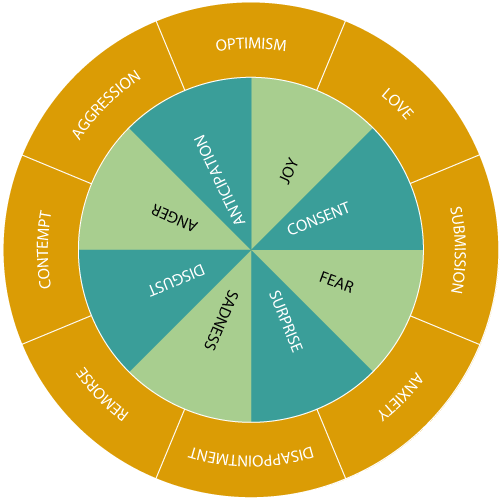
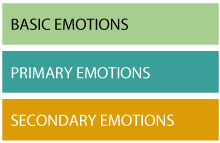
RESILIENCE
The concept of Resilience comes from Physics but in Psychology it refers to the ability:
- TO FACE ADVERTITIES
- TO REORGANIZE YOUE LIFE POSITIVELY FACING DIFFICULTIES
- TO REBUILD YOURSELF REMAINING SENSITIVE TO THE POSITIVE OPPORTUNITIES THAT LIFE OFFERS WITHOUT ALIENING YOUR IDENTITY
Recovering from an experience of strong change may neither be a quick intuitive reaction nor a slow and passive undergoing. Instead it requires a process that has to be carefully built and elaborated. Resilience is a skill that can be learned and concerns the possibility of finding “reflective spaces” that are able to promote the acquisition of resilient behaviours.
The ability to manage one’s emotions and the efficient relationship with others in various contexts are the basis for developing good personal and collective resilience. Resilience also means having the strength to get up with self-determination after falling. Life stories like Anna Franck’s agenda or Nelson Mandela’s life are famous examples of rsilience.
In our world of continuous and frenetic changes resilience will prove decisive in supporting the development and well-being of individuals and groups. It will also impact corporate cultures and our way of living within our society.
IMPORTANCE
soft skills
The ability to efficiently manage human relations.
Resilience
To cope positively with difficult events and moments.
Value added
Soft skills and resilience create value added and make the difference.
DO YOU WANT TO KNOW YOUR CSI, CRE AND IR10 ?
Measure your “intelligences” through our tests.



DEVELOPMENT
Can I improve my emotional, social intelligences and resilience ?
THE ANSWER IS DEFINITELY YES
through your will, awareness and motivation in following a development, both by coaching and self-training.
What is essential:
- Consciousness of the attainable results
- Targets of improvements
- Program to accomplish
- Motivation in achieving the goal
The focus is improving own behaviours, not changing personal traits.
The advantages of a better relation
- Better communication, understanding and “reading” other people
- Better negotiation skills
- Less anxiety and stress
- More confidence in own means
- More ability to influence others and exercise a positive leadership
- Less tension in decision making and all critical steps of professional and personal life
- Better quality of life
EVOLUTION IN THREE PHASES FOR INSTITUTIONS

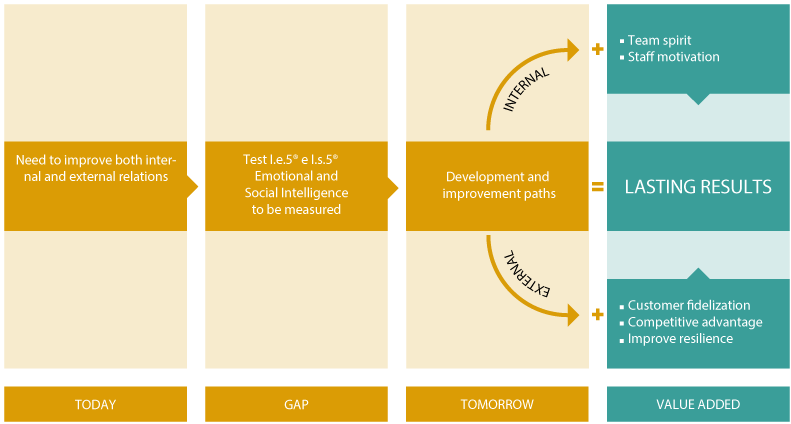
EVOLUTION IN THREE PHASES FOR INDIVIDUALS

